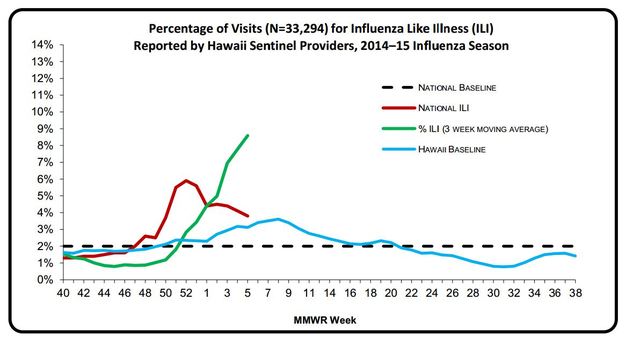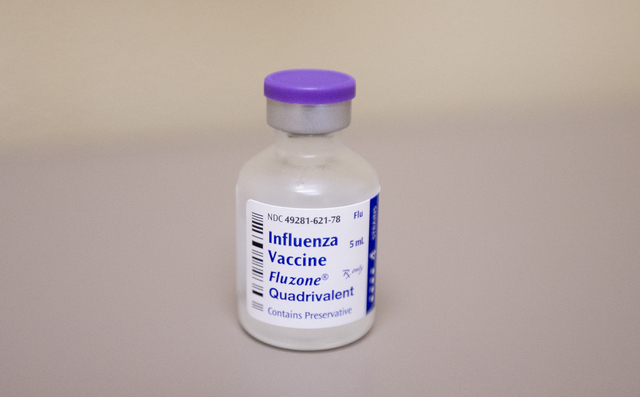The flu season is winding down across much of the mainland, but it’s still going strong in Hawaii. ADVERTISING The flu season is winding down across much of the mainland, but it’s still going strong in Hawaii. “We’re still seeing
The flu season is winding down across much of the mainland, but it’s still going strong in Hawaii.
“We’re still seeing a fair amount of flu,” said state epidemiologist Dr. Sarah Park. “Right now the levels of activity are high, but maintaining at a stable point.”
The nationwide flu season’s 13th week, which ended Feb. 14, was still elevated, “but continues to decrease,” according to the Centers for Disease Control and Prevention’s latest FluView report. Across the country, the number of visits to health care providers in relation to flu dropped from 3.7 percent to 3.2 percent.
This season, a total of 86 pediatric deaths nationwide have been attributed to the flu.
Meanwhile, the first week of February saw three new clusters, or outbreaks at schools and nursing homes, of flu reported in Hawaii, with 8.3 percent of all state resident outpatient visits being related to influenza-like illness, according to the most recent data available from the state Department of Health’s Disease Outbreak Control Division.
So far this season, a total of 23,172 specimens have been tested for the influenza virus, with 4,348 coming back positive. Of those confirmed cases, 4,147 were influenza A, and 201 of the cases were of the generally less severe influenza B virus.
As of Feb. 7, no pediatric deaths in Hawaii had been linked to the current flu season, according to the most recent data made available through the state’s Influenza Surveillance Report.
Hawaii was one of 12 states experiencing high activity involving outbreaks of influenza-like illnesses during the week ended Feb. 14, according to the CDC.
Dr. Kristine McCoy, director of the Hawaii Island Family Medicine Residency program, said Tuesday
that Hawaii’s flu season this year has been the worst she’s seen since the worldwide H1N1 flu pandemic of 2009.
“What we’ve been seeing is quite a few hospitalized patients because of the flu,” she said. “We’ve seen both major strains of the flu, both A and B. And they (patients) just keep coming. It’s been a persistent and bad flu season.”
She did, however, say that so far most East Hawaii residents have been handling the flu properly, with few people coming to the Hawaii Island Family Health Center unless they are experiencing serious complications.
McCoy explained that if people feel like they are coming down with the flu, “the best thing they can do is stay home.”
Staying in bed, getting plenty of fluids, and keeping away from other people is the best way to fight the virus and to prevent passing it on to others, she said.
“It doesn’t feel like we’ve had a lot of people coming into the clinic to be diagnosed,” she said.
“I feel like most people have been acting appropriately. They’re staying home and doing the self care that, for the vast majority of people, is going to be sufficient to get them through the viral illness. Only when it becomes pretty overwhelming to them are they coming in to urgent care after hours or the emergency room.”
In addition to the flu, Park said that the state also is experiencing an unusually bad cold season.
“We’re seeing quite a bit of other respiratory pathogens,” she said. “We’re telling people, ‘Yes, get a flu vaccination, but don’t forget about doing other things, like washing your hands. And if you’re feeling sick, why are you at work?’”
While Park couldn’t say whether the recently voggy conditions in East Hawaii have played a part in making people with the flu sicker, she did say that any respiratory illness can make the flu and colds worse.
“It’s hard to know what role the vog plays, as there really haven’t been any studies,” she said. “That would be speculation, what the effects of vog are. But we do know in general that when there are conditions that could exacerbate your asthma and you get even a minor cold, it’s going to be that much worse. Let alone if you have the flu.”
People who have asthma or other problems breathing and are within the “at-risk population,” should see their doctors, or even better call their doctors, she said.
“Let them know you’re sick, and they might consider empirically treating you or getting a diagnostic done,” she said.
Anti-viral medications are mainly only used to prevent complications in elderly and at-risk patients, she added.
“For every other healthy person, just go home, get some rest and fluids,” she said.
Email Colin M. Stewart at
cstewart@hawaiitribune-herald.com.









